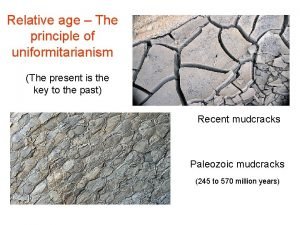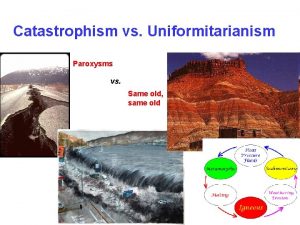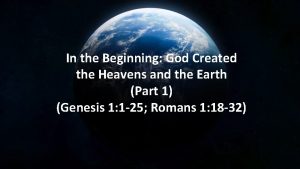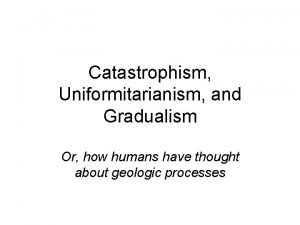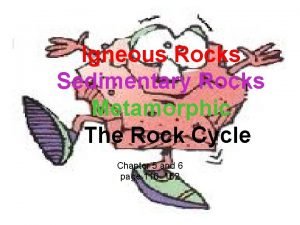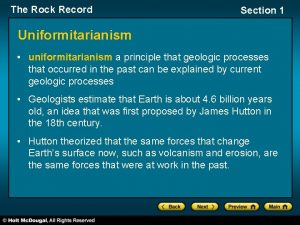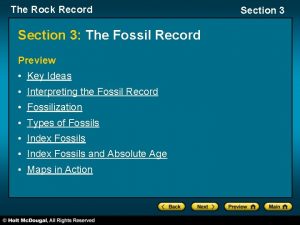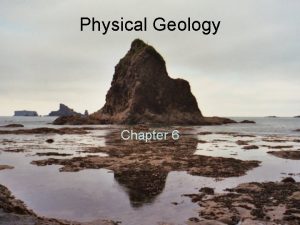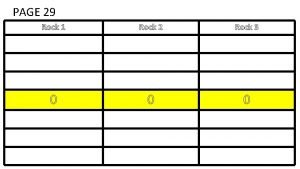Physical Geology Chapter 6 The Rock Record Uniformitarianism


















































- Slides: 50

Physical Geology Chapter 6 The Rock Record

Uniformitarianism Is a theory that rejects the idea that catastrophic forces were responsible for the current conditions on the Earth. The theory suggested instead, that continuing uniformity of existing processes were responsible for the present and past conditions of this planet.


• In the mid-seventeenth century, biblical scholar and Archbishop James Ussher determined that the earth had been created in the year 4004 BCE. Just over a century later James Hutton, known as the father of geology, suggested that the earth was much older and that processes occurring in the present were the same processes that had operated in the past, and would be the processes that operate in the future. This concept became known as uniformitarianism and can be summarized by the phrase "the present is the key to the past. "

• Sedimentary rocks are formed particle by particle and bed by bed, and the layers are piled one on top of the other. Thus, in any sequence of layered rocks, a given bed must be older than any bed on top of it. This Law of Superposition is fundamental to the interpretation of Earth history, because at any one location it indicates the relative ages of rock layers and the fossils in them.

Very simply put…………. .

• Law of Original Horizontality states that most sediments, when originally formed, were laid down horizontally. However, many layered rocks are no longer horizontal. Because of the Law of Original Horizontality, we know that sedimentary rocks that are not horizontal either were formed in special ways or, more often, were moved from their horizontal position by later events, such as tilting during episodes of mountain building.

If not horizontal, look for clues to original position of layers and then apply the law of superposition

Clues • Graded beds – beds of decreasing sized sediment particles • Cross beds – curved shaped beds at an angle to the bedding plane • Ripple marks – peaks of ripples oriented upward


Unconformities • • disconformity Nonconformity Angular unconformity Breaks in the geologic record


Crosscutting relationships • A fault or igneous intrusion is always younger than the rock layers it cuts through • If through an unconformity, it is younger than all above and below the unconformity




























• Radioactive elements have half-lives • # of half lives may be calculated • Years since formation of rock or strata may then be calculated

Absolute Dating Methods

The Fossil Record • Fossil – remains of organisms • Index fossil – occur only in and are identified with specific strata • Paleontology – study of fossils • Sedimentary rock – “home” of fossils


How about……. ?


Or……? burrows Dinosaur tracks Worm tubes

Index Fossils lived for a short geologic time but over a large area so are indicative of a particular era in geologic time

Index Fossil example – Indicative of the Silurian and Ordovician periods

 Igneous rock to metamorphic rock
Igneous rock to metamorphic rock Chapter 21 fossils and the rock record answer key
Chapter 21 fossils and the rock record answer key Uniformitarianism examples
Uniformitarianism examples Hutton's principle of uniformitarianism
Hutton's principle of uniformitarianism Principles of stratigraphy
Principles of stratigraphy Uniformitarianism examples
Uniformitarianism examples Whats uniformitarianism
Whats uniformitarianism Catastrophism theory
Catastrophism theory Uniformitarianism drawing
Uniformitarianism drawing Uniformitarianism
Uniformitarianism Gradualism vs uniformitarianism
Gradualism vs uniformitarianism Example of running record observation of a child
Example of running record observation of a child Define physical geology
Define physical geology Rock cycle sedimentary
Rock cycle sedimentary Igneous rocks metamorphic rocks and sedimentary rocks
Igneous rocks metamorphic rocks and sedimentary rocks Adventure sports bungee jumping
Adventure sports bungee jumping A rock climber's shoe loosens a rock and her climbing buddy
A rock climber's shoe loosens a rock and her climbing buddy Chapter 3 standardized test practice answers
Chapter 3 standardized test practice answers How do rocks form
How do rocks form Hình ảnh bộ gõ cơ thể búng tay
Hình ảnh bộ gõ cơ thể búng tay Bổ thể
Bổ thể Tỉ lệ cơ thể trẻ em
Tỉ lệ cơ thể trẻ em Chó sói
Chó sói Glasgow thang điểm
Glasgow thang điểm Bài hát chúa yêu trần thế alleluia
Bài hát chúa yêu trần thế alleluia Môn thể thao bắt đầu bằng từ đua
Môn thể thao bắt đầu bằng từ đua Thế nào là hệ số cao nhất
Thế nào là hệ số cao nhất Các châu lục và đại dương trên thế giới
Các châu lục và đại dương trên thế giới Công thức tính độ biến thiên đông lượng
Công thức tính độ biến thiên đông lượng Trời xanh đây là của chúng ta thể thơ
Trời xanh đây là của chúng ta thể thơ Mật thư tọa độ 5x5
Mật thư tọa độ 5x5 101012 bằng
101012 bằng Phản ứng thế ankan
Phản ứng thế ankan Các châu lục và đại dương trên thế giới
Các châu lục và đại dương trên thế giới Thơ thất ngôn tứ tuyệt đường luật
Thơ thất ngôn tứ tuyệt đường luật Quá trình desamine hóa có thể tạo ra
Quá trình desamine hóa có thể tạo ra Một số thể thơ truyền thống
Một số thể thơ truyền thống Bàn tay mà dây bẩn
Bàn tay mà dây bẩn Vẽ hình chiếu vuông góc của vật thể sau
Vẽ hình chiếu vuông góc của vật thể sau Thế nào là sự mỏi cơ
Thế nào là sự mỏi cơ đặc điểm cơ thể của người tối cổ
đặc điểm cơ thể của người tối cổ Ví dụ về giọng cùng tên
Ví dụ về giọng cùng tên Vẽ hình chiếu đứng bằng cạnh của vật thể
Vẽ hình chiếu đứng bằng cạnh của vật thể Tia chieu sa te
Tia chieu sa te Thẻ vin
Thẻ vin đại từ thay thế
đại từ thay thế điện thế nghỉ
điện thế nghỉ Tư thế ngồi viết
Tư thế ngồi viết Diễn thế sinh thái là
Diễn thế sinh thái là Các loại đột biến cấu trúc nhiễm sắc thể
Các loại đột biến cấu trúc nhiễm sắc thể




